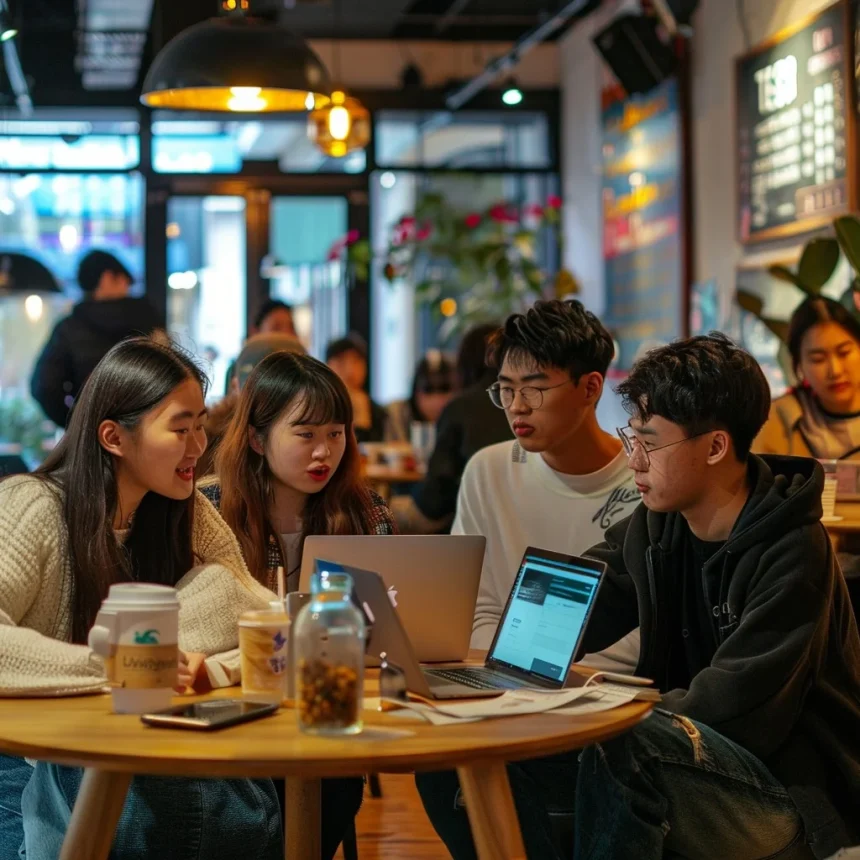What Is a “Third Place” and Why It Matters
Third places are social environments separate from home and office where people gather to study, relax, and connect. In South Korea, cafés have come to serve this role for young people—offering a casual, community‑oriented alternative to formal workplaces and cramped dorm rooms.
Study Cafés: Blending Focus and Community
Gen Z in Korea increasingly favours study cafés—spaces that combine quiet productivity with aesthetic ambiance. These cafés offer free Wi‑Fi, ambient lighting, and privacy booths, all at reasonable prices. Unlike the office environment, they allow longer stays with minimal pressure, making them ideal third‑space study hubs.
Aesthetic Appeal and Instagrammable Vibes
Trend-conscious Gen Zers value cafés for their carefully curated interiors. “Influencer cafés” with photo‑friendly décor draw visitors seeking both a productive space and an appealing backdrop for social media posts. This aligns with the broader rise of café culture as an aesthetic status symbol.
Affordability vs. Isolation
In densely populated cities like Seoul, shared housing is often small or devoid of communal space. Gen Z finds cafés to be affordable alternatives to homes that lack privacy or study space. A typical drink costs around 5,000 KRW (~US $3–4), enabling extended stays without breaking the budget.
Social Dynamics and Belonging in Neutral Territory
Study cafés offer more than just individual study zones—they also foster weak social ties. Patrons encounter other students or solo workers, allowing light social engagement without commitment. This “neutral ground” supports relaxed interactions, helping Gen Z build community while maintaining focus.
From Work to Third Space: The Appeal Over Offices
While offices are associated with hierarchy, routines, and formal expectations, cafés convey informality and autonomy. Gen Z seeks environments where personal comfort and flexibility combine with access to resources. The informal norms of café spaces better match their preference for self-directed work and social freedom.
Why This Trend Is Uniquely Korean (and Youth-Driven)
Korea now ranks among the world’s top coffee markets, driven by youth culture and social media influence. Gen Z particularly values café spaces as markers of identity, design taste, and “small but sure happiness” (“sohwakhaeng”)—an ethos that balances minimal luxuries with everyday life choices.
Implications for Urban Life and Work Culture
As cafés become de‑facto third places, they reshape expectations around where and how young people work and connect. Many smaller cafés intentionally foster community—hosting reading groups or offering quiet shared space—blurring the line between commercial and communal space. Employers and urban planners may take note: the definitions of workspace are evolving beyond offices to include these public‑facing third places.
Conclusion: A Shift in Where Gen Z Belongs
For Korea’s Gen Z, study cafés offer an ideal third place—combining affordability, comfort, social ambience, and aesthetic appeal. As more young people prioritize flexibility and community over formality and structure, these cafés increasingly serve as preferred alternatives to traditional workplace environments, redefining what it means to study, work, and belong in the city.











